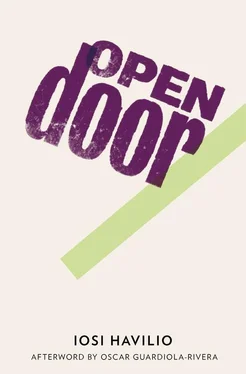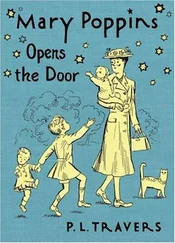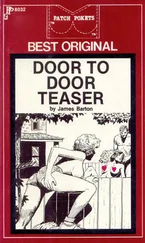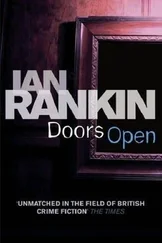Dawn breaks. I start to get cold, a light but continuous shiver passes through my body. Pieces of burnt sky covered by a single, red, uniform cloud reach me through the rafters.
‘Aren’t you saying anything?’
Eloísa speaks very close to my face, far more seriously than usual, challenging me.
‘This place is hell, why don’t you have an abortion and stop kidding yourself you’ve still got time to think about it?’
I look her in the eye, I stroke her hair, she curls up in my arms, she apologises.
‘I’m sorry,’ she says, ‘I’ll say anything.’
All day alone in the house, devouring pieces of plaster, loose rendering from the wall behind the wardrobe. I resist as long as I can, but the impulse is stronger than me, unstoppable. It leaves me with a harsh, piquant taste in my mouth, inflaming my throat. How long can this go on?
Jaime is moving his mouth, as if speaking, but I can’t hear a single word. I’ve just opened my eyes and the first thing I see is a mountain landscape with very tall pines that cover nearly the whole sky. It’s hanging in the middle of a wall papered with flowers so small they make me dizzy and force me to shut my eyes again. I’m exhausted. I breathe deeply, dispel all the air through my nose and look again. I can’t control my eyes, they open and shut in spite of me. Behind Jaime there’s a window covered with white curtains and a bit further over, in a corner, a kind of metal clothes rack. Above my head there are two neon tubes stuck to the ceiling, one switched on, the other off. My feet itch, I would love to be able to scratch them. To my right, a fat lady in a pale blue apron is also moving her lips, she’s standing up, and bit by bit, I begin to make out scraps of words.
Things suddenly become clear. I’m lying in a hospital bed, Jaime is talking to a nurse and immediately that other hospital I woke up in some months ago comes into my mind. This feels more or less the same.
I want to raise a hand to say here I am. My arm doesn’t respond straight away and only when I manage to shake it with the minimum of energy do Jaime and the nurse stop talking and turn their full attention to me. They observe me silently for a few seconds, waiting for me to do something else, I don’t know what.
Now Jaime moves closer and strokes my hand, still in the air, and places it back beside the other. I try to speak, to ask the first questions, but Jaime silences me by raising his index finger to his lips as nurses in posters do.
‘Rest,’ he says twice, ‘stay calm.’
I spend what is left of the day lying in bed, Jaime entering and leaving the room without saying much. At one point, without wanting to, I find myself with a mirror. I’ve never seen myself looking so horrible. Night falls and I’m fully awake at last. A different nurse brings me a tray with a piece of skinless chicken on a cushion of runny mash and a jelly the colour of piss.
‘Eat,’ says Jaime, ‘it’ll do you good.’
The nurse presses a button and the headboard rises until I’m almost sitting up. The chicken, the mash and the jelly all have the same taste of nothing. I quickly swallow all I can, Jaime eats the rest.
‘You fainted,’ he begins to tell me, ‘I found you in the kitchen. They’re going to do some tests. They say that if everything’s OK, you can leave tomorrow.’
The night seems eternal, it feels like morning will never come. My head is full of gaps. Every time Eloísa enters my mind, I think about something else to get rid of her quickly.
Jaime can’t sleep either. He’s sitting on an armchair by the side of the bed. Our eyes meet two or three times and we become rather idiotic, each of us with a load of questions that the other won’t answer because we never do. At one point I’m on the verge of confessing what he’s going to find out sooner or later, but I don’t know how.
The next day, with the tests that say I’m pregnant stuffed safely in my trouser pocket, Jaime helps me to dress and pays the hospital bill.
On the way home, just after the level crossing, at almost the exact place we first met, Jaime says that I should have told him sooner. He says it in a whisper, embarrassed, and I don’t know how to respond.
I don’t want to even think about how things are going to be from now on.
Outside it’s thundering, without raining. The thunderclaps are long. They grow, they draw out, they growl, they burst and they extinguish. Jaime managed to get me a computer a few days ago, an old model, but it works. The mouse only moves from side to side, so I need to touch the little ball every now and again to get it in the right place. The monitor is one of those you used to get, fourteen inches and convex. The image flickers and every so often the colours disappear, then suddenly return. The keyboard makes a lot of noise, but evenly. All the letters sound the same, the a is the same as the l , the j as the s , the same as the space bar, the comma, the full stop, the underscore, the brackets, all the same. It’s a cacophonous language. Only the intensity and the rhythm change. I wonder whether Jaime can sleep with all this hammering. It would seem so. He’s on his back with his hands crossed on his chest, serene. This paternity business has returned him to his old self, docile and melancholic, like the other Jaime.
Now it shows, my stomach is just beginning to separate me from the edge of the table. Only a few centimetres, it’s almost imperceptible, but it shows. At least I notice it, and that short distance fills me with questions, it distracts me. If it’s a boy, will Jaime want to call him Jaime, like him and the other Jaime? When should it start kicking? When will the cravings come? How late on can I abort? I don’t know, I just wonder.
Yesterday I went to bed early, at around eleven; Jaime stayed in the kitchen smoking with the radio on. The dream came immediately, very clear, and either I was to blame for interrupting it, or it was the thirst that was scratching at my throat and drying the roof of my mouth until I could bear it no longer and woke up. If I’d had a pitcher of water to hand, who knows, perhaps the dream would have gone on.
It was a vast room, five metres by eight, a magnificent and luminous place. The flat is on a coastal avenue by the beach, second or third floor. The city is Rio de Janeiro. There’s a white leather couch, extremely large, for four or five people, between two clear columns, which are actually fish-tanks full of bubbling water, with oxygen pumps but no fish. There’s another armchair, with an anatomically shaped back and a footrest. And another, upholstered in cowhide, the fibres bristled with static, with a movable base so that it can rock. All the chairs are occupied by suntanned people, mainly twenty-something men, in light and frivolous clothing, their feet mostly bare and playful. They murmur but don’t speak. They propose toasts and laugh. They seem happy. There are two or three, a woman, a man with very little hair, smooth-skinned and chubby-cheeked, and someone else I can’t see, who zigzag gently between the seats, and disappear down a long corridor full of pictures or photographs of clouds, and I follow them until the point where they leave me. I stop outside a bathroom with no door, and a woman sitting on the toilet, wearing thick-framed, feline glasses, her trousers round her ankles, smiles at me, draws her knees together and leans forward: she’s small. I haven’t seen her before. I stay there for a few seconds, or longer, without annoying her, until she starts to pee. Then I get a bit lost, in the kitchen, in the bedrooms, too alone, until I’m back at the party.
Читать дальше












